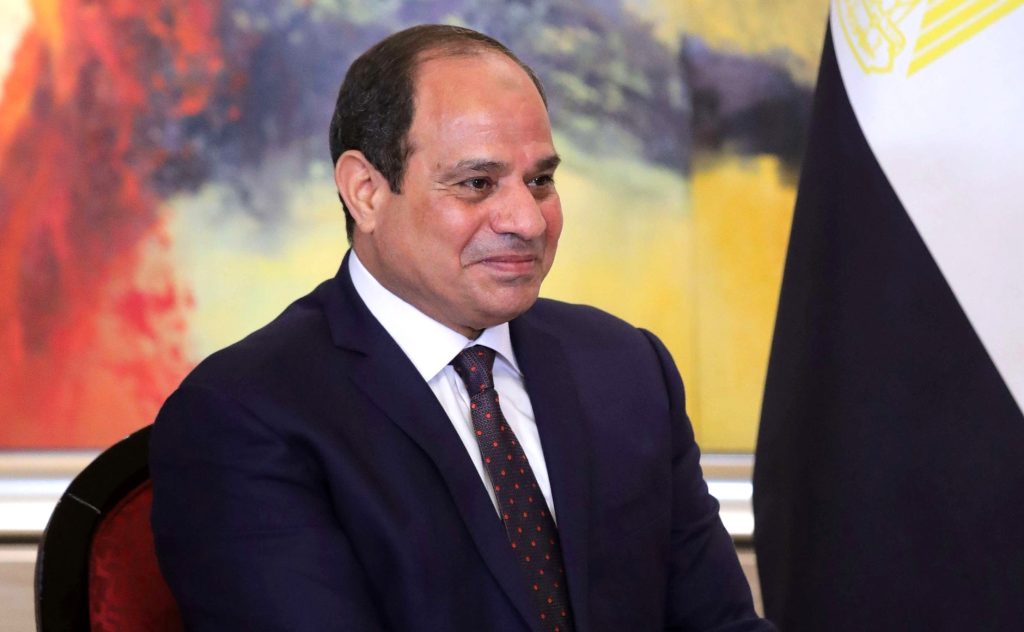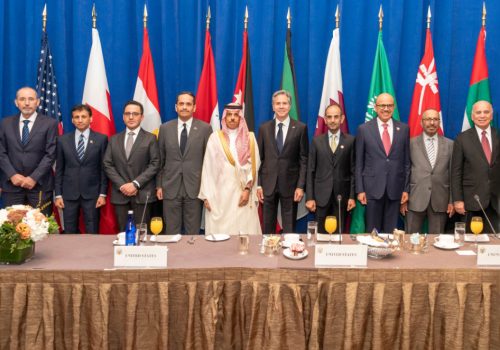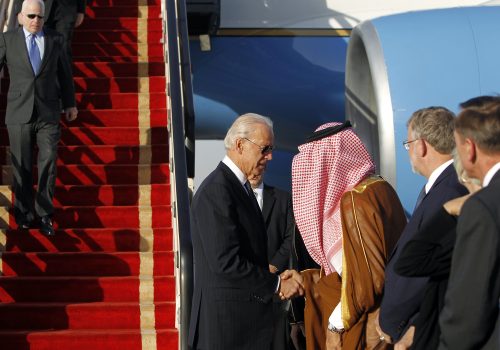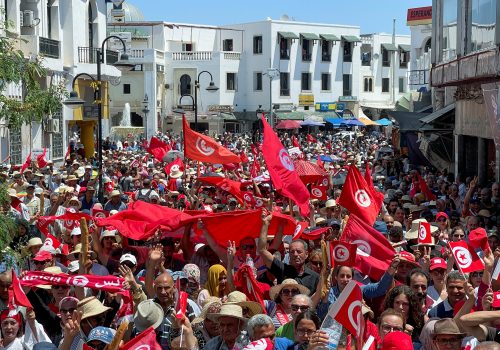Following the end of the 2011-2013 revolutionary period in Egypt, the author had the opportunity to engage with a senior minister in one of the Gulf Cooperation Council (GCC) states in a private setting on the GCC’s relationship with the Arab world’s most populous nation. The nuances and details of the political realities in Cairo, the author recalls, were relatively unimportant. The calculus was unassuming, pragmatic, and blunt: “We need Egypt to be stable.” That sentiment wasn’t simply his own; arguably, it’s the same sentiment that has dominated the mindset of pretty much all GCC leaders when it comes to Egypt, and that feeling hasn’t changed—although how it has been expressed over the past decade has.
GCC rifts and support for Cairo in the post-revolutionary era
At the outset of the Arab Spring era in 2011, Saudi Arabia and the United Arab Emirates (UAE) strongly supported the continuation of Hosni Mubarak’s presidency, seeing him as a bulwark against instability and the rise of nonstate political Islamism of the Muslim Brotherhood (MB) type. Qatar, in contrast, had excellent relationships with different political Islamist groups around the region, including the Egyptian MB, having served as a safe haven for many regional exiles from these groups over the early part of the twenty-first century. Doha came out in strong support of the new political dispensation post-2011, which saw the end of the Mubarak regime.
With the end of the 2011-2013 revolutionary period in Egypt, strongly endorsed by Saudi Arabia and the UAE, a new realignment took place. Doha expressed initial rejection of the post- Mohamed Morsi and MB-led authorities in Cairo, and also demanded a return of the Qatari deposits in Egypt’s central bank, which exceeded US$6 billion. The gap was quickly replaced by Saudi Arabia, the UAE, and Kuwait, and the normalization of Egypt’s new political regime by Qatar followed in 2014, with Doha recognizing Abdel Fattah al-Sisi as Egypt’s president, and accepting Saudi mediation to mend relations between Qatar and Egypt,reverting to a more pragmatic foreign policy footing in the region.
Against that backdrop, Egypt became more dependent on foreign financing in the form of long-term deposits and loans from GCC states, due to food insecurity, energy needs, and interest-rate shocks. Between 2014 and 2017, Cairo benefited from GCC states being more or less on the same page vis-à-vis Egypt, with the only relative outlier being Doha, against which Cairo still held a grudge owing to continued criticism of Egypt’s authorities from Al Jazeera’s media network. Nevertheless, despite the underlying tensions, these differences were nothing compared with the 2017-2021 period when the Saudi-UAE-Bahraini-Egyptian boycott of Qatar took place. Any financial investment from the GCC into Egypt during that period naturally saw little to none from Qatar; conversely, the political and economic relationship among Egypt, Saudi Arabia, and the UAEdeepened.
In the aftermath of the boycott, this has all radically changed, with Doha and Cairo agreeing earlier this year, for example, to establish a $1 billion joint investment fund. Cairo’s relations with Doha are on a par with those with other capitals in the GCC, and the rationale of the relationship is similar to that of the UAE and Saudi Arabia—which is to say there has been an overall move, as of late, to be more commercially focused.
Moving from fiscal support to commercially viable investments
When it comes to that relationship, there has been a trend of oil-rich Gulf states generally bailing out Egypt in terms of Cairo’s financial woes, particularly over the past decade. In the first period, these regional GCC powers were essentially donors, providing huge monetary largesse in light of their common concern over the stability of the Arab world’s largest country. Billions of US dollars were deposited into Egyptian banks during that period.
Over time, however, Gulf capitals became more reluctant to directly underwrite Cairo, and preferred to redirect their funds, albeit still aimed at Egypt. In the past, the focus was primarily on what these states considered to be in support of stability. As far as these states are concerned, the security concerns underpinning that direction have subsided, and these GCC countries are far more interested in returns on their investments.
This did not mean the ending of Gulf money to Egypt, but it meant a share of Gulf funds have been repurposed for commercial investments, not exclusively as grants and low interest loans, as was more often seen previously. Saudi Arabia’s Public Investment Fund and Abu Dhabi’s ADQ (the Emirates’ sovereign wealth fund) spent $4 billion in 2022 alone acquiring commercial stakes in various Egyptian companies.
Structural reforms and Egyptian economic woes
Egypt maintained reasonable, if insufficient, macroeconomic growth levels until relatively recently, even against the impacts of the COVID-19 pandemic, despite the microeconomic concerns (including persistent insufficient progress in poverty reduction), and a 2016 substantial devaluation of the Egyptian pound. In more recent years, however, the economy, on both the macro and micro economic levels, has been facing tremendous difficulty.
The official rate of the Egyptian pound in 2016 was around eight pounds to the dollar, and then the first major devaluation saw its value more than halve. Up until March 2022, that rate (approximately fifteen pounds to the dollar) held; one might compare that to today—the pound is now trading at more than thirty-one pounds to the dollar. That has had knock-on effects on inflation and food prices, where we have seen massive upsurges; April 2023 saw 32.7 percent inflation as compared with the previous month, while Egypt’s annual core inflation rate was 38.5 percent.
It has been argued, including by the International Monetary Fund (IMF) itself, that there have been deep structural issues with the Egyptian economy that have made the model rather unsustainable. The repercussions arising from the Russian invasion of Ukraine upon emerging markets exacerbated those issues, and crystalized them. Cairo’s foreign bond investors withdrew around $20 billion out of Egypt’s debt, which the authorities needed to fund its current account deficit, an expression of cynicism that began prior to the Russian invasion altogether. In response, Cairo had to request assistance from the IMF and the Gulf. Egyptian delegations, both officials and from the business community, engaged in Doha, Abu Dhabi, Riyadh, and elsewhere trying to attract investment from the more prosperous Gulf states to mitigate the repercussions from the Russian invasion, which, as noted, exacerbated existing fault lines. As an example, a $5 billion investment deal between Cairo and Doha was signed in March 2022 after the Qatari foreign minister visited Egypt. Egypt’s president put it very clearly as guest of honor of the World Government Summit in Dubai: “The most important point here is support from our brothers.”
GCC-Egyptian expectations mismatch
But unlike previous similar periods, there is now a substantial clash over vision, and it has become particularly stark. There is a complete mismatch between Cairo and the Gulf due to increased concern around Egypt’s economy from within the GCC, and a frustration over expected reforms that have failed to materialize.
Perhaps most controversially, state ownership, including that of the military, of much of the Egyptian economy has become more and more of an issue for international investors, as well as the IMF, which has provided several loans to Egypt over recent years. As far as these GCC states are concerned, Egypt’s macroeconomic policies—including state ownership—are now a matter of interest, as they may impact returns on GCC investments, and the need for the GCC to be financially involved in Egypt in the first place. In this regard, the IMF, and Egypt’s GCC partners, are aligned and united on an ambitious goal: “to press Cairo to undertake structural reforms.” But while such reforms are arguably direly important for the long term, in the short term their impacts are likely to be rather painful for society to bear, posing concerns around political instability.
As Cairo seeks to find ways to ease its foreign currency shortage, and fill an estimated $17 billion financing gap, it has suggested selling different state-owned assets. The most likely purchaser of such assets would be Gulf allies, but little has taken place by way of mass sales, with analysts proposing that Cairo is pushing too hard of a bargain. As one international banker told the Financial Times, “Egypt’s position is to sell things at a massive premium to market prices because the Egyptians argue the current markets are depressed and don’t represent the long-term value.” Irrespective of whether Cairo is correct in this regard, it does not obviate the gap between Egypt and the GCC on such fundamental points, nor the different leverage—to put it bluntly, Egypt needs the financial dividends from the sales, rather more than the GCC needs the purchase.
Beyond the incongruity in expectations in terms of prices, there is also a wider mismatch in terms of structural economic reforms, which the Gulf is increasingly insisting on. As Saudi Arabia’s finance minister said at the World Economic Forum in January 2023, “We used to give direct grants and deposits without strings attached, and we are changing that. We need to see reforms.” That lack of common agreement on fundamental macro issues pertaining to the Egyptian economy has meant that Cairo has lost out on huge investments from the GCC—Saudi Arabia’s Public Investment Fund pulled out of the purchase of the state-owned United Bank earlier this year, and Qatar did the same vis-à-vis a military-owned biscuit manufacturer. Abu Dhabi’s own sovereign fund has halted many of its projects in Egypt, but did come to an agreement with Cairo to purchase 1.9 billion USD of state assets in July, described by one UAE-based analyst as, “It’s still too little in terms of what was promised, but at least it’s a step in the right direction.”
The direction of travel is clear. In 2014, an Emirati interlocutor made clear to the author that Abu Dhabi was loathe to speak of conditions in terms of its support for Cairo; the suggestion would seem uncouth, even if the conditions were in Egypt’s own long-term interest, and not in the spirit of “brotherly Arab relations.” Today, Gulf states want Egypt to reduce the size of the Egyptian military and the state in its economy, float the Egyptian pound, and take further steps to liberalize the Egyptian economy in accordance with IMF recommendations and conditions—and they are not shy to say so.
Future prospects
The mood in Cairo seems to presently be that “Egypt is too big to fail”—and that outside actors will intervene to ensure that Egypt does not default on its debt and go into economic freefall. That may have been the case in the past, but the economic realities of the region and the GCC are no longer what they once were, and growing frustration in the GCC, as evidenced by the substitution of grants and deposits with a clear desire to engage in commercially viable investments, may change that calculation. It might be disastrous for the GCC to let Egypt default, but it may be that the GCC assesses that it would be more disastrous not to. Moreover, it is completely in the GCC’s direct interest that certain steps be taken, such as the further devaluation of the Egyptian pound—it would make its further purchases more economically affordable.
The overall geopolitical positioning of Egypt against this backdrop is also worth considering and watching. Cairo currently continues to be of far more importance on the Palestinian-Israeli file than any other Arab state by far—but that comes fundamentally into play when there is a crisis of some kind in the Palestinian territories under Israeli occupation. Otherwise, the “peace process” between the Israelis and the Palestinians is past being moribund. On other wider files, different Gulf states, particularly Saudi Arabia, have taken pole position in terms of geopolitical power and influence, as evidenced by the reintegration of Syria’s Bashar al-Assad into the Arab League, or the reconciliation between Saudi Arabia and Iran. In both cases, Cairo was not crucially involved. In the Sudanese crisis currently underway, Saudi Arabia’s role in addressing the conflict rivals Egypt’s, whereas this would have been quite different a decade or so ago. Cairo’s economic woes may have unintended consequences in other ways going forward as well.
H.A. Hellyer is a scholar at the Carnegie Endowment for International Peace and senior associate fellow at the Royal United Services Institute.
In partnership with

Related content
Image: Egyptian President Abdel Fattah El-Sisi continues to leverage his relationship with the GCC to help secure fiscal support. | Wikimedia Commons taken on September 4, 2017



